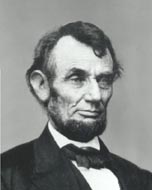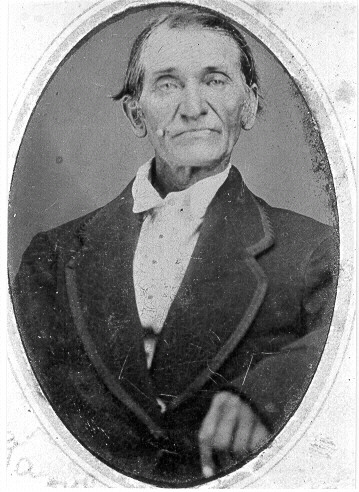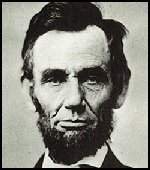Copyright © 2010, 2016
Lincoln/Hanks/Enloe
Physical Characteristics Abraham Lincoln and His Parentage
With all due respect to Robert Vincent Enlow, his argument that Lincoln was not a Lincoln at all, but an illegitimate son of Abraham Enloe, is based on rumor, hearsay, and a photo comparison* that pales beside the above. In addition to the obvious, notice in particular the ears and the cheek moles. Both men have right ears that are set significantly lower than their left ears, and both men have a mole at the bottom of the crease on the right cheek. While one mole is noticeably larger than the other, it might be that the older man's grew as he aged. No, the man in the center photo is not Lincoln's father, but it is his first cousin, Jacob Lincoln (1815-1889). Jacob's father was Josiah, brother of President Lincoln's father, Thomas Lincoln. Had the President lived another ten or fifteen years and shaved his beard, he may well have passed for a twin of Jacob, except perhaps for the mouth. Jacob's mouth, in fact, appears to have been affected by paralysis, perhaps from a stroke, altering its natural form. It should be noted also that Lincoln's eyes may appear dark in photographs, but he described them in his 1859 autobiography as grey. Notably, not one original source has been located to support the testimonies solicited by Herndon and others claiming an Enloe parentage for the President. If physical resemblance is any evidence of a blood relationship as Enlow suggests, however, the above comparison cannot be ignored. In any case, there is more to one's genetic make-up than one's father, and Thomas Lincoln's physical appearance may well have resulted from his own mother's DNA rather than that of the Lincolns.
Lincoln/Hanks/Enloe Physical
Characteristics In discussing the resemblances or lack thereof between Abraham Lincoln, Thomas Lincoln, and Wesley Enloe, Robert Enlow glaringly ignores an informant who had pointed out the resemblance between Abraham Lincoln and his mother. He thus omits half of the equation which determines genetic physical traits ~ just as we would be doing if we were to ignore the fact that Thomas Lincoln may have resembled his own mother more than he did the Lincolns. With that principle understood, consider one of the many letters collected by William Herndon, the President's former law partner. John Hanks, brother of Nancy (Hanks) Lincoln, wrote that Nancy was five feet ten inches tall1/, an exceptionally great height for a woman of that day. A woman of such stature certainly would carry the genes for male offspring attaining a height in excess of six feet. In the same letter, Hanks also wrote that Nancy had "Black haire [and a] Dark complexion," both of which have been claimed as Enloe traits shared with Lincoln. In addition to the letter written by John Hanks, there is a letter from Robert L. Wintersmith, a neighbor of the Lincolns in Kentucky. Wintersmith wrote to Herndon's collaborator, Jesse Weik, that "Sammy [y]oung bro. of Nancy Hanks and his descendants were all very tall and slender,"2/ again traits claimed as Enloe traits.
Both of these informants
are ignored
by Enlow, and both reveal that Lincoln's resemblance to his mother and her family
was such that the lack of resemblance to his father is irrelevant as it
concerns the traits claimed by Enlow. In fact, however, Lincoln's
facial features were strikingly like those of his first cousin Jacob Lincoln.
Lincoln's Birth According to Enlow In his argument for an Enloe paternity, Robert Enlow also asserts a "lack of hard data in the Kentucky Tradition ..."; i.e., the lack of a marriage record for Thomas Lincoln and Nancy Hanks predating the President's birth. Unfortunately for that argument, original documentation has more recently been unearthed from the records of Rev. Jesse Head, a Reformed Methodist Episcopal minister in Kentucky, who married Thomas and Nancy in Kentucky on 12 June 18063/; and a Marriage Bond has been found in the files of the County Clerk of Washington County, Kentucky. In contrast, the lack of hard data is exactly what is true of Enlow's argument for a North Carolina birth, and proponents of the Enloe theory have no original records to prove their claim. For authority, Enlow relies heavily on Herndon, referring to him as the "toughest enemy to the genesis cover-up." Enlow's confidence is misplaced. Length of acquaintance does not necessarily determine depth of familiarity, nor does it guarantee honesty and objectivity. The fact that Herndon partnered with Lincoln for twenty years is one thing. The question of whether he was entirely knowledgeable and honest in his accounts is quite another. In one place, Herndon wrote concerning a book on the Christian faith owned by Lincoln: "[Rev.] Smith gave Lincoln a book of his. Lincoln never condescended to write his name in it."4/ Touted by skeptics and atheists as the man who knew Lincoln best, Herndon either did not know Lincoln as well as his reputation suggests ... or deliberately chose to ignore the fact that Lincoln rarely wrote his name in books of any kind.5/
Worse yet, Herndon demonstrated a perfect willingness to color the
truth concerning the same book. He said that Lincoln "threw it down
upon our table - spit upon it as it were - and never opened it to my
knowledge."6/
The characterization "spit upon it as it were" [emphasis added] is
clearly Herndon’s interpretation of Lincoln’s attitude and not a statement
of fact. If a statement of fact, where are the words by which
Lincoln expressed his disdain for the book? Did he truly throw the book
down, or did he merely drop it on the table? Was the action a sign
of disrespect ... or simple carelessness, weariness, or exasperation with
something else entirely? Is there any human being who has not, at
one time or another, tossed or slapped down whatever object happened to be
in hand because of exasperation with the words or deeds of another person?
Does such an action mean that one hates the object one was holding?
In relating the incident in question, Herndon intentionally
created the impression that it was the book itself which caused Lincoln's
carelessness, weariness, or
exasperation ...
It
behooves us, in order to accurately judge Herndon’s veracity and
reliability concerning Lincoln, to consider not only what Herndon wrote
but also the nature of his relationship with Lincoln during their twenty
years of working together. Herndon described the office he shared with Lincoln as "a dull, dry place so far as pleasurable or interesting incidents are concerned."7/ He was offended by Lincoln’s indulgence of his sons’ behavior in the office,8/ and his disdain for and contention with Lincoln’s wife are well known.9/ The latter circumstance may have been restrained during Lincoln's lifetime, but it nevertheless had a chilling effect on the relationship between the partners. Herndon was never invited to the Lincoln home, either in Springfield or in Washington. When the Lincolns held their first Christmas dinner at the White House, Herndon was not among the old friends from Illinois and Kentucky whom the Lincolns invited. Lincoln's law partner of twenty years was never afforded the prestige of a visit to the Presidential mansion. Herndon later wrote that, once Lincoln left Springfield, the two never saw each other again.10/
Plainly, the Lincoln-Herndon relationship was merely professional, and not
much to Herndon's benefit at that, other than being a means of living.
While still in Illinois, in fact, Lincoln himself was at odds with Herndon
on more than one account. One exchange in particular must have
greatly offended Herndon. Herndon wrote to Lincoln on one occasion
and argued that President Polk, as commander-in-chief, had the right to
wage war against Mexico without the authorization of Congress. On 15
February 1848, Lincoln responded: Kings had always been involving and impoverishing their people in wars, pretending generally, if not always, that the good of the people was the object. This, our Convention understood to be the most oppressive of all Kingly oppressions; and they resolved to so frame the Constitution that no one man should hold the power of bringing this oppression upon us. But your view destroys the whole matter, and places our President where kings have always stood.11/
How
must Herndon have felt when he read his senior partner's suggestion that
he, Herndon, might be in favor of reverting the nation to the tyranny of
monarchy from which it had been freed less than seventy years before?
Surely, too, Herndon apparently was unhappy with his responsbility for the day-to-day routine and maintenance of that "dull, dry place",
as he described the office he shared with Lincoln, while
Lincoln rode the circuit, met with clients and witnesses, and experienced
life beyond the desk and the dust. What of the period when, as a
Senator, Lincoln spent many months in the nation’s capitol? When
Lincoln was at home and working in the office, the flow of people
there was much increased and often created an atmosphere of great
comradery. All of that, however, focused on Lincoln the
Indian-fighter, Lincoln the lawyer, Lincoln the politician ... Lincoln the
story-teller. When he was gone again, how quickly did the scene
return to one of cheerless drudgery? Then, when he departed finally
for the highest office of the land and told Herndon to keep the practice
going until he returned from the White House, how did Herndon truly feel?
And how did he feel about never enjoying the privilege of a visit to the
White House?
Was
Herndon's biography of his former partner compiled out of nothing more or
less than a genuine concern for the truth … or was it, at least in part,
out of a degree of masked resentment or jealousy? Perhaps the
nation’s overreaction to Lincoln’s death, bestowing upon him a kind of
sainthood, was for Herndon one reminder too many of how great a man
Lincoln was and how much Lincoln had achieved or enjoyed, while he,
Herndon, kept the business going and sat in relative obscurity.
Then
there is the compelling motivation of monetary gain. When Lincoln
became President, Herndon did attempt to maintain their law practice on
his own, but with little success. With Lincoln's assassination, the
former days were gone forever, and Herndon wasted no time. A mere
month later, he began to compile material for a Lincoln biography, which
he expected half the country would clamor to own. Only eight months
later, he gave his first public lecture. Unfortunately, much of what
Herndon said and wrote called Lincoln’s character and marriage into
question, and his law practice met its demise. He then undertook the
hard life of a farmer, and was no more successful there. In the
midst of great financial struggle, he pursued the biography, which he
surely hoped would bring him financial soundness. Did he
deliberately set out to tarnish Lincoln’s halo while hoping to improve his
own circumstances? Was he seeking his own bit of glory with less
than scrupulous care for Lincoln’s reputation? Herndon could not
have been oblivious to the fact that, in those days, the bastard often was
treated as though he were as guilty as the parent or, at best, customarily
was considered an object of ridicule and scorn.
No,
rather than being "the toughest enemy to the genesis cover-up," as Enlow
refers to him, Herndon merely demonstrates that he was willing, perhaps
even eager, to lower public opinion of Lincoln's character for his own
benefit.
Relying on Herndon, unfortunately, Enlow states: "Herndon gave the full text of
what Lincoln said to him: ... 'My mother was a bastard, was the daughter
of a nobleman so called of Virginia ...' " In all honesty, Enlow ought to
have written "... what Lincoln reportedly said to him, etc.," for we
have only Herndon's word for the conversation. Lincoln being dead
and gone and unable to refute anything, Herndon was free to attribute
whatever he pleased to Lincoln. In any case, Nancy Hanks' parentage
has nothing whatsoever to do with whether or not President Lincoln's
father was Thomas Lincoln. Nancy might have hatched out of an egg
and still borne the child of either Enloe or Lincoln. Yet Herndon
seems unsatisfied with raising the specter of illegitimacy concerning
Lincoln himself and apparently felt compelled to bring Lincoln's
grandmother into the "scandal" as well.
Concerning Lincoln's mother, Enlow further reports: "Herndon added that
while 'Mrs. Lincoln bred like a rat in Kentucky she had no more children
in Indiana.' " and "Herndon reported that when Old Ben Hardin wanted to,
he could use the girl Nancy most any time ..." Lincoln's mother "bred like a rat"!!??! She could be used "most any time"??!!? Consider these base accusations in light of Lincoln's autobiography, and consider also the fact that between the years of Nancy Hanks' marriage to Thomas Lincoln in 1806 and her death in 1818, Nancy in fact bore only three children in all - a daughter named Sarah, Abraham, and a son named Thomas.12/ This can scarcely be called prolific childbearing in an age when many families had anywhere from a half dozen to a dozen children or more. Perhaps it was assumed by those who promote an Enloe paternity for Abraham Lincoln that his mother Nancy had additional children who simply did not live past infancy or early childhood -- or perhaps they merely hoped others would believe so. However, Lincoln specifically stated in his autobiography that he had no brother or sister of the whole or half blood and then explained that there had been one sister who was grown and married, but died many years ago and one brother who died in infancy.
And
what was Herndon's source for all his early "history" of the Lincoln
family? Did he obtain primary source records such as birth records,
baptismal records, family Bibles, or a Lincoln or Hanks diary? No,
he merely repeated rumor and suspicion which had been passed among the
Enloes and a handful of their friends and neighbors.
On
that point, it must not be overlooked that the Enloe story was being
circulated in North Carolina, where people considered President Lincoln a
tyrant and might well relish the prospect of labeling him a bastard. Lincoln's Birth According to Lincoln
I was born Feb: 12th. 1809 in Hardin county, Kentucky. My father’s name is Thomas; my grandfather’s was Abraham, -- the same of [sic] my own. My grandfather went from Rockingham county in Virginia, to Kentucky, about the year 1782; and, two years afterwards, was killed by the indians. We have a vague tradition, that my great-grand father went from Pennsylvania to Virginia; and that he was a quaker. Further back than this, I have never heard any thing. ... Owing to my father being left an orphan at the age of six years, in poverty, and in a new country, he became a wholly uneducated man, which I suppose is the reason why I know so little of our family history ... If you be able to trace any connection between yourself and me ... I should be pleased to have a line from you.13 Less than a month later, the future President wrote also to one David Lincoln of New Jersey: There is no longer any doubt that your uncle Abraham, and my grandfather was the same man. His family did reside in Washington county, Kentucky, just as you say you found them in 1801 or 2. ... Uncle Josiah [father of Jacob in the photo above], farther back than my recollection, went from Kentucky to Blue River in Indiana. ... My father, Thomas, is still living, in Coles county Illinois, being in the 71st. year of his age. ... Do you know any thing of your family (or rather I may now say, our family) farther back than your grand-father?14 Are we to believe that Lincoln was not only a bastard but a liar as well, or did he speak the truth when he gave his birth date as February 12, 1809 and his father's name as Thomas? Would Lincoln deceive men who shared his family name and were inquiring of him about their shared relationship? In about June 1860, Lincoln went so far as to write an autobiography which then appeared in three publications, and that autobiography again talked of his father Thomas Lincoln and grandfather Abraham Lincoln.15 The old question of nature vs. nurture might inject itself into this debate since Herndon, Enlow, and others would have us believe that Nancy Hanks and Thomas Lincoln were the lowest kind of people. Is it possible that morals and values such as those of which the couple are accused could have shaped the noble character of the future President? That question will be reserved for others to argue. In this debate, however, it cannot be denied that William Herndon - on whose authority Enlow relies for his assertion of an Enloe paternity - is unreliable at best and unscrupulous at worst. Herndon, being discredited, leaves only a blurred photograph of a tall, lean man and the rumors of a handful of that man's neighbors as support for this, perhaps the worst and most detestable, of Lincoln myths and rumors.
SOURCES
PORTRAITS President Lincoln, 9 Feb 1864, by Anthony Berger, Washington, DC Jacob Lincoln, c. 1880-1890 (in the possession of his third-great-grandson Charles Avery Walk) President Lincoln, 8 Nov 1863, by Alexander Gardner, Wasington, DC
|


